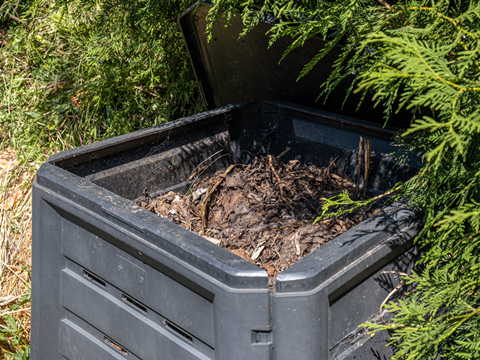
An exclusive, long-term contract between Carbios and Sleever aims to develop home-compostable, mono-oriented traverse shrink films to label, wrap, and secure such products as wines and spirits.
The contract involves a master supply agreement of the Carbios Active enzymatic solution for PLA biodegradation. When integrated directly into the film manufacturing phase, Carbios Active is said to enable films with high levels of PLA to be composted at room temperature without leaving behind microplastics or toxic substances.
Carbios anticipates that the encapsulated enzyme will result in a ‘new generation’ of biopolymer products that can be composted at ambient temperatures in any soil condition, all while guaranteeing a ‘high quality’ of compost.
A production line is already in operation at Carbios’ headquarters in Clermont-Ferrand, France. It is believed to be capable of producing 2,500 tons of Carbios Active every year, which is apparently necessary to product the equivalent of 50,000 tons of enzymed PLA annually.
The resultant films are anticipated to serve as an eco-designed solution for packaging with no dedicated value chain; they are expected to be used in the luxury goods and mass retail markets, among others.
Sleever will offer its knowledge of film formulation, printing, manufacturing, and provision of services in shrink sleeve label applications. Its work with Carbios is expected to contribute to its goals of overcoming roadblocks to packaging recyclability, lowering the carbon footprints of products, and subsequently accelerating and increasing circular economy streams.
“Our partnership with Sleever to bring compostable sleeves to market opens up new commercial opportunities for Carbios, particularly in the wine and spirits sector where Sleever is a leader,” explains Carbios CEO Emmanuel Ladent. “Thanks to the inclusion of Carbios Active in the formula, these types of packaging become compostable at room temperature, and therefore contribute to a more sustainable packaging industry.”
Eric Fresnel, president of Sleever Group, adds: “Our commitment for over 15 years to developing eco-designed packaging solutions to meet the needs of brands naturally brought us closer to Carbios. Today, after 4 years of development, we are proud to have entered into this partnership.
“This innovation completes our offer to markets keen to strengthen their impact in terms of the circular economy, and opens up real prospects on international markets.”
Carbios Active was recently the subject of an article published in the scientific journal Nature by Carbios and the Toulouse Biotechnology Institute. The text explained that the engineered enzyme can withstand a temperature of 170°C, the same temperature as molten PLA during the plastic production process; and that, because the enzyme is only activated under composting or methanization conditions, it remains intact when stored – meaning it can be manufactured into sauce packets, wrappers, and other flexible packaging.
In other news, various companies have pursued different kinds of compostable labels and films in recent months. Gamma Supplies Ltd has applied a certified paper-based, home-compostable and biodegradable label directly to fresh produce, said to break down at the same rate as food skins without leaving toxins behind; while Green Heart Solutions aims to avoid single-use plastics by converting Futamura’s NatureFlex cellulose into compostable flexible sachets for Chilean health food producer Soy Silvestre’s wheatgrass shots.
Carbios has also worked with L’Occitane en Provence and Pinard Beauty Pack to distribute the L’Occitane Amande shower oil in a transparent PET bottle made entirely from enzymatic recycling. It is claimed that enzymatically recycled plastic reduces CO2 emissions by 57% and avoids 1.3 tonnes of oil for every tonne of recycled PET produced.
If you liked this story, you might also enjoy:
The ultimate guide to the Packaging and Packaging Waste Regulation in 2024
How are the top brands progressing on packaging sustainability?
Sustainable Innovation Report 2024: Current trends and future priorities
Everything you need to know about global plastic sustainability regulation














No comments yet